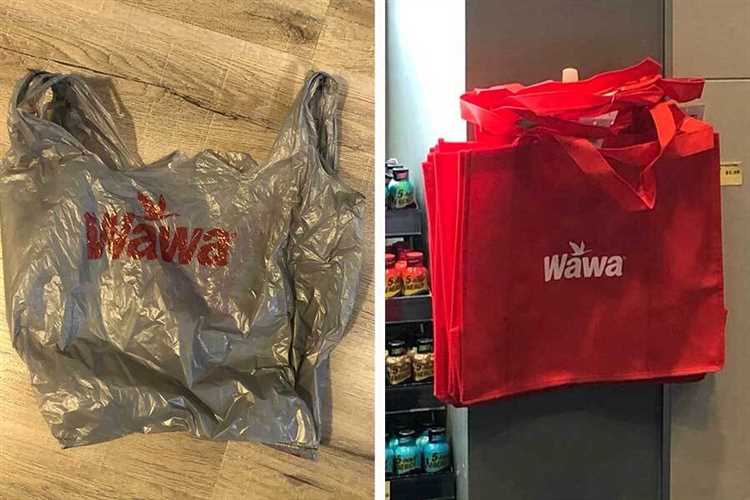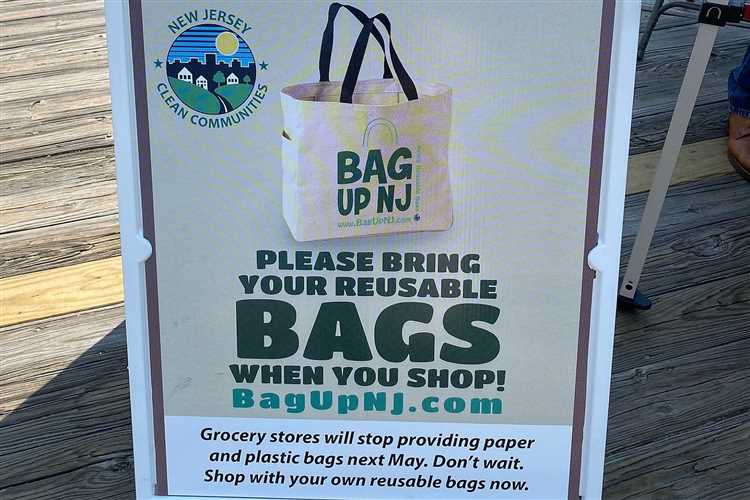
Philadelphia, one of the largest cities in the United States, is taking a bold step towards reducing the environmental impact of plastic waste. In an effort to combat pollution and promote sustainability, the city has implemented a ban on single-use plastic bags.
This new legislation, which came into effect on July 1st, 2022, prohibits retail establishments from providing customers with plastic bags at checkout. Instead, shoppers are encouraged to bring their reusable bags or purchase paper bags for a small fee.
The ban applies to a wide range of retailers, including grocery stores, convenience stores, and pharmacies. However, certain exemptions exist for specific types of items, such as raw meats or prescription medications, which may still be packaged in plastic for safety and hygiene reasons.
The decision to ban single-use plastic bags is a significant milestone for Philadelphia’s sustainability efforts. Plastic bags have long been a major contributor to pollution, clogging waterways, harming wildlife, and taking hundreds of years to decompose. By implementing this ban, Philadelphia is taking a crucial step towards a cleaner and greener future.
- Background of the Plastic Bag Ban
- Scope of the Ban and Its Impact on Businesses
- The Impact on Businesses
- Alternative Solutions for Carrying Goods
- 1. Reusable Shopping Bags
- 2. Paper Bags
- 3. Backpacks or Tote Bags
- Benefits of Implementing the Plastic Bag Ban
- Challenges and Opposition to the Ban
- Resources for Staying Informed about the Ban
- Q&A,
- What is the reason behind the plastic bag ban in Philadelphia?
- When did the plastic bag ban go into effect?
- Are all types of plastic bags banned in Philadelphia?
- What alternatives are available to shoppers after the plastic bag ban?
- What are the penalties for violating the plastic bag ban in Philadelphia?
- Why is Philadelphia implementing a plastic bag ban?
- When will the plastic bag ban go into effect?
Background of the Plastic Bag Ban

In an effort to reduce plastic waste and promote sustainable practices, Philadelphia implemented a ban on single-use plastic bags. The ban was introduced in [year] and was met with mixed reactions from the community.
The ban aims to encourage residents to switch to reusable bags made from sustainable materials such as cloth or paper. The goal is to decrease the amount of plastic bags that end up in landfills, pollute waterways, and harm wildlife.
Philadelphia’s plastic bag ban is part of a larger movement towards reducing single-use plastic waste. Many cities and states across the country have implemented similar bans, and some have even gone as far as to implement a tax or fee on single-use plastic bags.
The ban applies to all retail establishments in the city, including grocery stores, convenience stores, and pharmacies. Businesses are required to provide alternative options for customers, such as reusable bags or compostable bags.
Since the implementation of the ban, there has been a significant decrease in the use of plastic bags in Philadelphia. However, there have been some challenges and concerns raised by both businesses and residents. These include the cost of providing alternative bags, the inconvenience of carrying reusable bags, and the need for education and awareness about the ban.
| Pros | Cons |
|---|---|
| – Reduced plastic waste | – Cost of providing alternative bags |
| – Protects the environment | – Inconvenience of carrying reusable bags |
| – Decreased pollution in landfills and waterways | – Need for education and awareness |
Overall, the plastic bag ban in Philadelphia is a step towards a more sustainable future. It encourages individuals to rethink their consumption habits and make choices that have a positive impact on the environment.
Scope of the Ban and Its Impact on Businesses
The plastic bag ban in Philadelphia is aimed at reducing the use of single-use plastic bags in the city in order to decrease plastic waste and its environmental impact. The ban applies to all retail establishments, including grocery stores, convenience stores, and restaurants.
Under the ban, businesses are no longer allowed to provide customers with single-use plastic bags at the point of sale. Instead, customers are encouraged to bring their own reusable bags or purchase reusable bags from the stores. Retailers have the option to provide paper bags or thicker reusable plastic bags for a fee of $0.15 per bag.
While the ban may pose some challenges for businesses, especially those that heavily rely on plastic bags, it also presents opportunities for innovation and sustainability. By finding alternatives to single-use plastic bags, businesses can showcase their commitment to environmental stewardship and attract environmentally-conscious customers.
The Impact on Businesses
The ban may require businesses to make changes to their operations and invest in alternative packaging options. This can involve sourcing and stocking reusable bags, training employees on the new policies, and potentially redesigning packaging displays to accommodate the switch.
However, the ban also presents cost-saving opportunities for businesses. By reducing or eliminating the use of plastic bags, businesses can save on the costs associated with purchasing and disposing of them. Additionally, the ban may lead to a decrease in litter and waste management costs for the city, which can benefit businesses and taxpayers alike.
Furthermore, the ban can enhance a business’s reputation and attract environmentally-conscious customers. By demonstrating a commitment to sustainability and reducing plastic waste, businesses can differentiate themselves in the market and build a positive brand image.
The plastic bag ban in Philadelphia is a step towards creating a more environmentally-friendly city and encouraging businesses to adopt sustainable practices. While it may require some adjustments, the ban offers opportunities for businesses to be leaders in sustainability and contribute to a cleaner, greener Philadelphia.
Alternative Solutions for Carrying Goods
With the plastic bag ban in place, it’s important to consider alternative solutions for carrying your goods. Here are a few options to consider:
1. Reusable Shopping Bags
Invest in a few reusable shopping bags made from fabric or recycled materials. These bags are durable and can be used multiple times, making them a sustainable choice for carrying your groceries or other items. Keep a few of these bags in your car or by the front door so you always have them ready for your shopping trips.
2. Paper Bags
Paper bags are another alternative to plastic bags. While they are not as durable as reusable bags, they can still be used for carrying lighter items. Look for paper bags made from recycled materials to reduce your environmental impact. Keep in mind that paper bags may not be suitable for handling wet or heavy items.
When using paper bags, it’s important to note that they can be reused or recycled. Consider using them for other purposes, such as storage or packing materials, before recycling them.
Tip: Remember to bring your own bags with you whenever you go shopping to avoid relying on plastic bags or having to pay for paper bags.
3. Backpacks or Tote Bags

If you’re only carrying a few items, consider using a backpack or a tote bag. These options not only eliminate the need for plastic bags but also allow for hands-free carrying. Plus, you can find stylish backpacks or tote bags that suit your personal style.
Remember that using alternative solutions may require some adjustments to your routine, but every effort counts towards reducing plastic waste and protecting the environment.
By adopting these alternative solutions, you can play a part in reducing plastic waste and contributing to a cleaner and greener Philadelphia.
Benefits of Implementing the Plastic Bag Ban
Implementing a plastic bag ban in Philadelphia has numerous benefits for the environment and the community as a whole. Some of the major benefits of implementing such a ban include:
1. Reduction in Plastic Waste:
Plastic bags are known for causing significant environmental harm. They take hundreds of years to decompose and often end up in landfills or as litter in our waterways. By implementing a plastic bag ban, Philadelphia will see a significant reduction in plastic waste, leading to a healthier environment.
2. Protection of Wildlife:
Plastic bags are hazardous to wildlife, especially marine animals. Many animals mistake these bags for food or become entangled in them, which can lead to injury or death. By banning plastic bags, Philadelphia will be taking a step towards protecting its diverse wildlife and preserving its natural ecosystems.
3. Conservation of Resources:
Plastic bags are made from non-renewable resources, such as fossil fuels. By reducing the production and consumption of plastic bags through a ban, Philadelphia will contribute to the conservation of these valuable resources, ensuring their availability for future generations.
4. Promotion of Sustainable Alternatives:
The plastic bag ban will encourage the use of sustainable alternatives, such as reusable bags. Reusable bags are made from materials like cloth or recycled materials and can be used multiple times, reducing the need for single-use plastic bags. This shift towards sustainable alternatives will help create a more environmentally conscious community in Philadelphia.
5. Financial Savings:
Implementing a plastic bag ban can lead to financial savings for both the city and its residents. Eliminating the need for plastic bag disposal and cleanup can reduce municipal expenses, while reusable bags can save consumers money in the long run by being a more durable and cost-effective option.
Overall, implementing a plastic bag ban in Philadelphia will not only have positive environmental impacts but also promote a more sustainable and responsible community. It is an important step towards reducing plastic pollution and protecting the environment for future generations.
Challenges and Opposition to the Ban

While the plastic bag ban in Philadelphia has been put in place to reduce waste and protect the environment, it has faced a number of challenges and opposition from various stakeholders.
One of the main challenges is the resistance from businesses that rely on plastic bags for packaging and transportation. These businesses argue that the ban will increase their costs and lead to a loss in revenue. They claim that alternative packaging options are more expensive and less durable, which could negatively impact their operations.
Another challenge is the inconvenience that the ban may cause for consumers. Some people argue that reusable bags can be difficult to remember or carry around, especially for those who rely on public transportation or have limited mobility. They also express concerns about the hygiene of reusable bags and the potential for cross-contamination.
Opposition to the ban also comes from those who believe that it is an overreach of government power. They argue that individuals should have the freedom to make their own choices regarding plastic bag usage and that the ban infringes on their rights. There are also concerns about the potential for unintended consequences, such as an increase in the use of alternative single-use products.
Additionally, there are challenges related to enforcement and compliance. It may be difficult for authorities to ensure that all businesses and individuals are adhering to the ban. There is also a need for education and awareness campaigns to inform the public about the ban and encourage behavior change.
Despite these challenges and opposition, proponents of the ban argue that it is necessary to address the environmental impact of plastic bags and to encourage the use of more sustainable alternatives. They believe that the benefits of the ban, such as reducing litter and protecting wildlife, outweigh the short-term challenges that may arise.
| Challenges | Opposition |
|---|---|
| Resistance from businesses | Belief in individual choice |
| Inconvenience for consumers | Concerns about government overreach |
| Hygiene and cross-contamination concerns | Potential unintended consequences |
| Enforcement and compliance difficulties |
Resources for Staying Informed about the Ban
If you want to stay up to date on the latest developments regarding the plastic bag ban in Philadelphia, here are some resources you can rely on:
| City of Philadelphia Website | Visit the official website of the City of Philadelphia to find information about the plastic bag ban, such as updates on implementation dates, frequently asked questions, and resources for businesses and residents. |
| Local News Outlets | Stay tuned to local news outlets, such as Philadelphia Inquirer, WHYY, and CBS Philly, for news articles, interviews, and investigative reports related to the plastic bag ban. These outlets often provide in-depth coverage and analysis of local issues. |
| Social Media | Follow the official social media accounts of the City of Philadelphia, as well as local news outlets, to receive real-time updates, announcements, and educational content about the plastic bag ban. Platforms like Twitter, Facebook, and Instagram can be valuable sources of information. |
| Community Events | Attend community events and public meetings organized by the City of Philadelphia and local organizations. These events provide opportunities to ask questions, voice concerns, and learn more about the plastic bag ban from experts and policymakers. |
By utilizing these resources, you can stay informed about the plastic bag ban in Philadelphia and ensure that you are complying with the regulations while minimizing your environmental impact.
Q&A,
What is the reason behind the plastic bag ban in Philadelphia?
Philadelphia implemented the plastic bag ban to reduce environmental pollution and promote sustainability. Plastic bags take hundreds of years to decompose, and they contribute to litter, endanger wildlife, and clog drains and sewers.
When did the plastic bag ban go into effect?
The plastic bag ban in Philadelphia went into effect on July 1, 2021.
Are all types of plastic bags banned in Philadelphia?
No, not all types of plastic bags are banned in Philadelphia. The ban only applies to thin, single-use plastic bags provided by retailers at the point of sale. Bags used for packaging bulk items, produce, or meat are exempt from the ban.
What alternatives are available to shoppers after the plastic bag ban?
Shoppers have several alternatives to plastic bags after the ban. They can bring their own reusable bags, use paper bags provided by retailers, or purchase reusable bags sold by retailers. Some stores may also offer incentives for using reusable bags, such as discounts or rewards.
What are the penalties for violating the plastic bag ban in Philadelphia?
The penalties for violating the plastic bag ban in Philadelphia start with a warning for the first offense. Subsequent violations may result in fines ranging from $100 to $300 for businesses. However, the focus is on education and compliance rather than punishment, and the city will work with businesses to ensure a smooth transition.
Why is Philadelphia implementing a plastic bag ban?
Philadelphia is implementing a plastic bag ban in order to reduce the amount of plastic waste generated in the city. Plastic bags are a significant source of pollution and can take hundreds of years to break down in the environment. By banning plastic bags, Philadelphia hopes to encourage residents to use more sustainable alternatives and reduce their overall plastic consumption.
When will the plastic bag ban go into effect?
The plastic bag ban in Philadelphia will go into effect on July 1, 2022. This gives businesses and residents time to adjust to the new regulations and find alternative ways to carry their groceries and other purchases. After this date, businesses will no longer be allowed to distribute single-use plastic bags to customers.